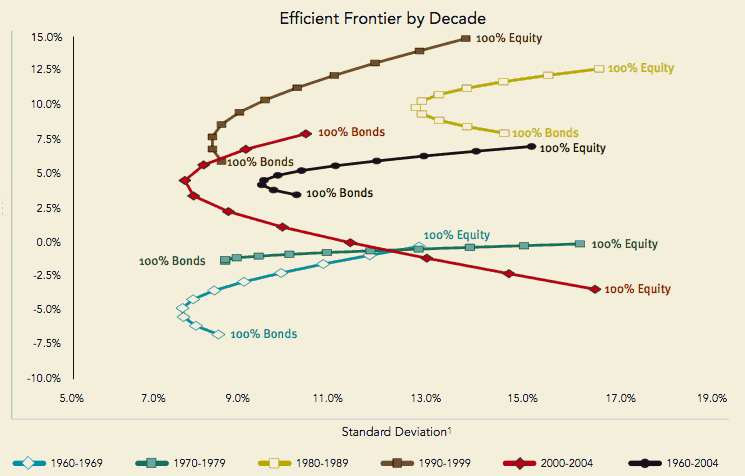If one's goal is to retire early, does it not make sense to invest in a 100% equity portfolio? This is my logic.
1) Historically, over the long tem, equities have performed better than cash.
2) Traditionally, 100% equity investors must worry that a down market will occur as they reach (effectively mandatory) retirement, thus forcing them to eat dog food. Thus, they must keep cash to ensure their portfolio will not crater in the period leading up to retirement.
3) If I am retiring early (especially if it will be very early), I have to option to delay retirement and continue working through a down market.
4) Thus, statistically speaking, on average retirement will occur earlier with a 100% equity investment. However, one must accept a relatively small potential for delayed retirement in order to obtain a larger chance of earlier retirement.
5) Just pulling numbers out of my rear, I look at it this way. Say a 30 year old traditional 60/40 investor has a 100% chance of retiring at 55 given their savings rate and expenses. With a 100/0 portfolio, they might have an 80% chance of retiring at 48 with a 20% chance of having to delay until 59. This decision is a no-brainer to me. (These numbers are demonstrative. I fully understand the math of probability distributions).
6) I have my money where my mouth is with a 95/5 portfolio for about 20 years (I need some emergency cash). My FA thinks I am crazy, and I did take a 25-30% hit in 2000-2002. OTOH, after about 20 years apiece in the market, he acknowledges that my net worth is much greater than his net worth, so I am doing something right.
Am I missing something? Who else uses this approach?
[Edit: Spelling]
1) Historically, over the long tem, equities have performed better than cash.
2) Traditionally, 100% equity investors must worry that a down market will occur as they reach (effectively mandatory) retirement, thus forcing them to eat dog food. Thus, they must keep cash to ensure their portfolio will not crater in the period leading up to retirement.
3) If I am retiring early (especially if it will be very early), I have to option to delay retirement and continue working through a down market.
4) Thus, statistically speaking, on average retirement will occur earlier with a 100% equity investment. However, one must accept a relatively small potential for delayed retirement in order to obtain a larger chance of earlier retirement.
5) Just pulling numbers out of my rear, I look at it this way. Say a 30 year old traditional 60/40 investor has a 100% chance of retiring at 55 given their savings rate and expenses. With a 100/0 portfolio, they might have an 80% chance of retiring at 48 with a 20% chance of having to delay until 59. This decision is a no-brainer to me. (These numbers are demonstrative. I fully understand the math of probability distributions).
6) I have my money where my mouth is with a 95/5 portfolio for about 20 years (I need some emergency cash). My FA thinks I am crazy, and I did take a 25-30% hit in 2000-2002. OTOH, after about 20 years apiece in the market, he acknowledges that my net worth is much greater than his net worth, so I am doing something right.
Am I missing something? Who else uses this approach?
[Edit: Spelling]


